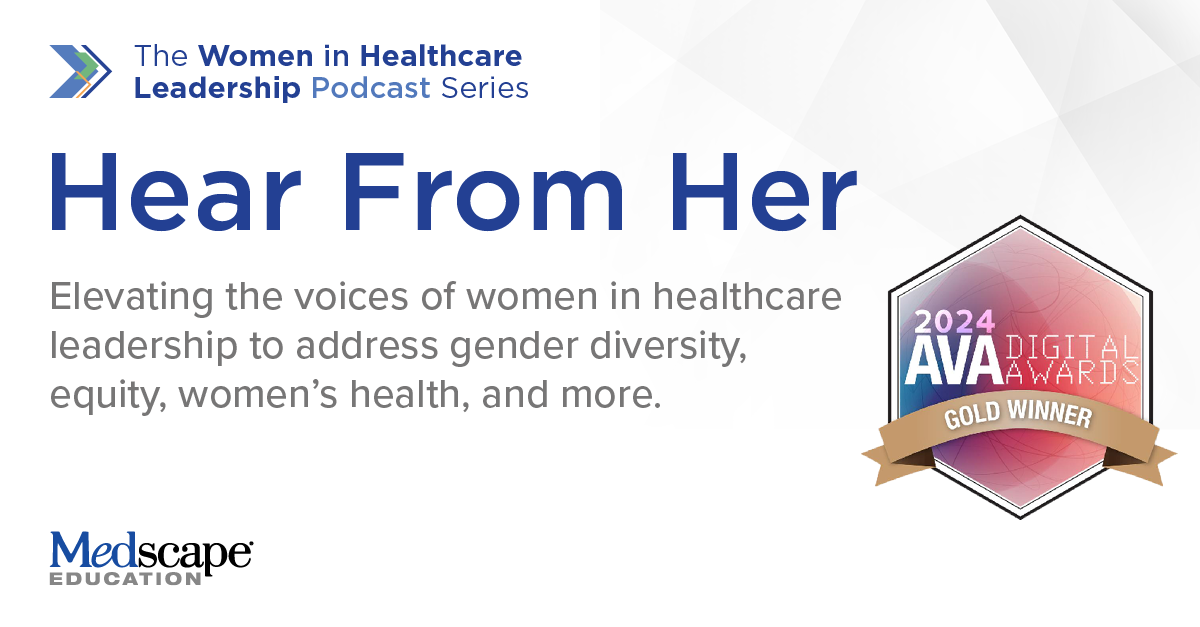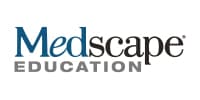Did You Hear From Her? If Not Here’s What You Missed in Season 1 of the Award-Winning Season Podcast Series
February 15, 2024 | Education, Leadership, Medscape, Women in healthcare
What are some of the biggest gaps that women face in healthcare today? “So many I could talk for hours!” said Shikha Jain, MD, FACP, President, CEO, Founder Women in Medicine. Jain was one of 11 renowned thought and industry leaders who did, in fact, talk about the myriad issues women face in the medical field and as patients in Season 1 of Medscape Education’s Hear from Her podcast—conversations that were insightful, eye-opening, touching, and occasionally heartbreaking.
Jain talked about her inspiration for founding the Women in Medicine Summit, an annual gathering where women in the field come together for community, support, and networking. A phrase that captured the feeling at this year’s summit, she says, was “Lift as you Rise,” about doing your part to bring others with you as you level up in your career. In all six episodes, the speakers noted the importance of mentorship, sponsorship, and advocacy of women by women as essential for changing the status quo.
On separate episodes, Carolyn Lam, professor and Director of Women’s Heart Health at the National Heart Center in Singapore, and Fatima Rodriguez, Associate Professor at Stanford University and Director of Preventive Cardiology, both shared their backstories about what drew them to specialize in women and heart health. Both noted that just a small percentage of lead authors on cardiovascular clinical trials are female, which has created a knowledge gap when it comes to learning about the differences in disease between men and women—including among women themselves.
Episode 3 featured a conversation with two leaders in neuropsychiatry, Antonella Chadha Santuccione, Co-founder and CEO of the nonprofit Women’s Brain Project in Zurich, Switzerland, and Wiesje van der Flier, Professor and Scientific Director of the Alzheimer’s Center in Amsterdam UMC in the Netherlands. The conversation touched on the differences in symptoms, progression, and treatment of psychiatric disorders between men and women, but mostly focused on themes that came up again and again throughout all of the conversations: Identifying the barriers for women when it comes to assuming leadership roles in healthcare, and getting more women into decision-making positions to ensure that women’s needs and experiences are being heard and adequately addressed.
In terms of moving up the career ladder, “men are more likely to choose men to follow them,” said van der Flier. So it’s really important for women to support one another. “We need more medical leaders who are female to eliminate the biases that are inherent in medicine — a discipline that has been mainly shaped by men,” Santuccione said, adding “I’m very passionate about this! It’s my personal battle to fix the issue” and reverse the narrative.
Oncology experts Dame Lesley Fallowfield, Director of Sussex Health Outcomes Research and Education and Cancer Institute in the UK, and Eva Thalmann, consultant and former External Scientific Relations Lead for Oncology, Europe, Middle East, and Africa, at Janssen, brought up the challenges of maintaining a work-family balance for many female medical professionals. But just because a woman takes time off to focus on her young children doesn’t mean her brain stops working! said Fallowfield (in her typically droll way). Thalmann made the point, which was also echoed throughout the series, that it’s up to the leaders of today to support younger colleagues and encourage them to “step up and lean in.” Go for that promotion. If you fail, you fail, but give it a shot even if you’re a little unsure – “because your male colleague wouldn’t hesitate!”
Perhaps someone in the Biden White House tuned in to these passionate, and powerful, conversations, and took notes. Last November, President Biden announced the first-ever White House Initiative on Women’s Health Research, to be led by First Lady Jill Biden and the White House Gender Policy Council. According to the press release, the new Initiative “will fundamentally change how we approach and fund women’s health research and pioneer the next generation of discoveries in women’s health. Despite making up more than half the population, women have historically been understudied and underrepresented in health research.”
That’s exactly how Sandra Milligan, Head of Research and Development at Organon, and Jennifer Goedken, Associate Professor of Gynecology and Obstetrics at Emory University School of Medicine, summed things up. As well as comprising half the population, they said, women are “an important component of our society and economy and family structure…. we need more women in leadership roles across the board, as lead researchers, CMOs, conference heads and CEOs” to not only shape the future of women’s healthcare but also to set an example for the next generation. “We really need to make this investment for women to move their health forward,” Milligan said.
Medscape was recently honored with a Gold at the AVA Digital Awards for this groundbreaking inaugural podcast series, and will continue amplifying and elevating women’s voices when Season 2 of Hear from Her kicks off this Spring. Upcoming guests include Sarah Jarvis, general practitioner, writer, and resident doctor on BBC Radio 2; Dr. Ophira Ginsburg, medical oncologist at the National Institutes of Health and co-chair of the Lancet Commission on Women and Cancer; and Anne-Marie Baird, president of Lung Cancer Europe. So stay tuned!
About Medscape Education Medscape Education (medscape.org) is the leading destination for continuous professional development, consisting of more than 30 specialty-focused destinations offering thousands of free accredited CME and CE courses for physicians, nurses, and other healthcare professionals.
This content was provided by Medscape Education Global






